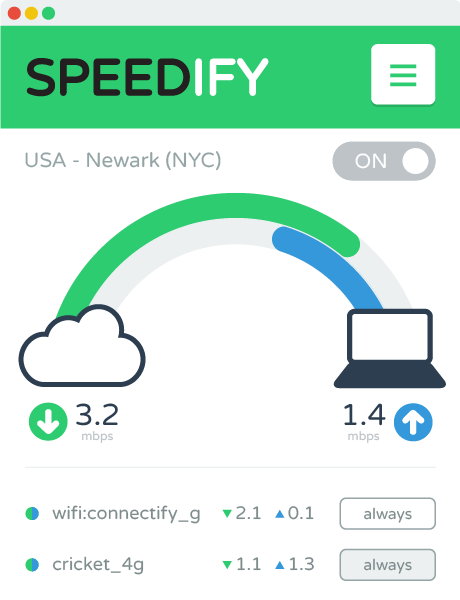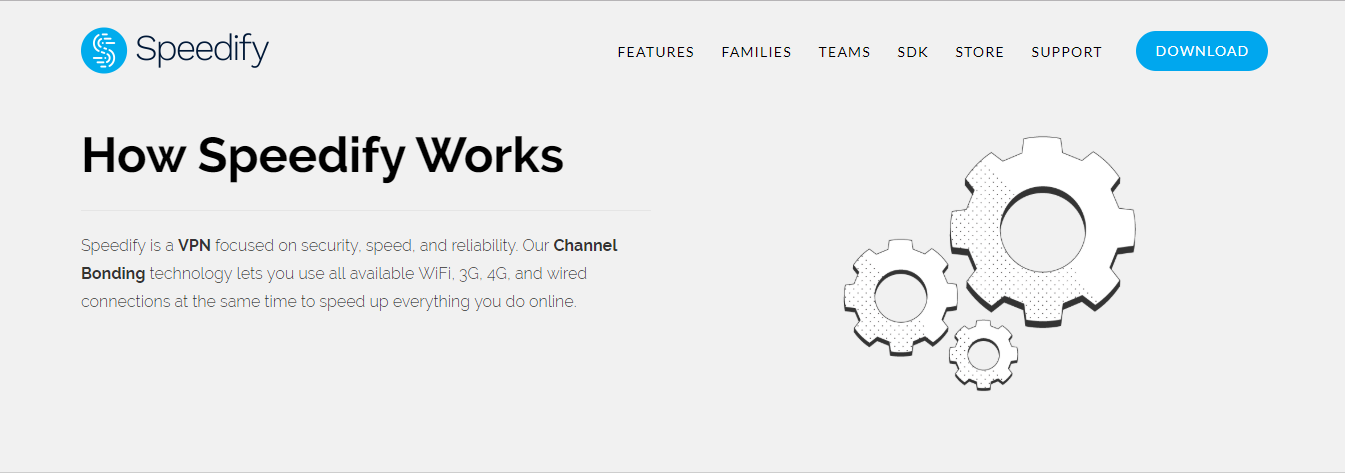
The list of additional features includes Redundant Mode and Automatic Failover. And what about ChaCha 256 – is it as good as AES 256-bit encryption? According to the experts, it is actually harder to crack. This protocol keeps your downloads/uploads going even when one of the connections fails. As mentioned in the intro, Channel Bonding allows you to put every single Internet connection in the vicinity to good use.

Secondly, it has its own, trademark technology, called Channel Bonding, and works in combination with ChaCha 256-bit encryption, another exclusive technology. First of all, it doesn’t support any of the popular encryption protocols (including OpenVPN and IKEv2). When it comes to security, Speedify isn’t a regular VPN. The provider promises to add Linux, routers, and gaming consoles support in the nearest future. So, even though the network is very modest and can’t compare to, say, Express VPN (3000+ servers), it is well spread around the globe.Īs for the supported platforms, Speedify is fully compatible with all of main operation systems. The rest are located in Asia (Hong Kong, Jakarta, Tokyo, Dubai), Africa, Oceania, and South America.The list includes Paris, Frankfurt, Amsterdam, Moscow, and Madrid, to name a few. In Europe, you’ll find servers in 26 cities.14 American cities, including LA, San Francisco, Chicago, NY, Miami, and more.Currently, the company grants access to servers in: Overall, Speedify has a server network of 200+ units, and they’re located in 35 countries across the world. DNS leaks, lack of P2P support, and difficulties with unblocking streaming services are even more reasons to start looking at other options on the market. The bad news is – Speedify belongs to the US jurisdiction (a member of the Five Eyes alliance) and keeps minor logs. Owners of desktop computers and mobile devices can protect up to five connections simultaneously. It can’t compete with the likes of NordVPN, but, you won’t be disappointed by the performance. And while the server network is modest, the company is doing a decent job of keeping them up and running. Channel Bonding, in combination with Kill Switch and the TOR browser, will make sure your OS is safe and sound. Peplink services require a PCQ-like limiter/QoS ISP, or TDD such as LTE or 5G, even then you need to adjust the queue buffer length manually, else you will have at least 10ms jitter, even on a 5ms connection to server.As most reviews claim, security is one of the reasons to pick Speedify as your VPN. *Latency was measured with an interval of 2ms, equivalent to ~128 tick competitive gaming server

OpenVPN (tlb and alb average, round robin halves the speed unless the latency is sharp 800ms -> gradually decrease to 60ms in 2 seconds.

WAN2: 12 down, 12 up, out of order, latency to VPS 55ms WAN1: 13 down, 1 up, in order, latency to VPS 50ms
#Speedify alternative download
Either way no rush on my end, I'm super super super busy :P I'll try to lend a hand either way you go, enjoy the family time it's so important and times like these in the world should remind us of that.Įxpected aggregation speed download : ~24mbit, upload ~12mbit I use both pretty heavily, and while I love OpenWrt when it works (I use them for ZeroTier mesh VPN nodes with Easyteather cell backups on Glinet hardware) when it doesn't work man can it be a pain. The RPi would allow you to use it as an in-between device vs a router that you could plug in several connections to (multiple 3/4g, multi USB wifi, etc) whereas an OpenWrt builds you're pretty stuck with the hardware inside it. That being said Open-Wrt is generally more point and click where Raspberry Pi is more powerful and would lean to more technical/enthusiasts groups. I know the ipk's have to be for a specific platform (like x86, arm, etc) but it's more vast. I would think an Open-WRT module would open it up for most people, however, you get into some weird chipset issues and I'm not sure what the differences would be for the various platforms.


 0 kommentar(er)
0 kommentar(er)
